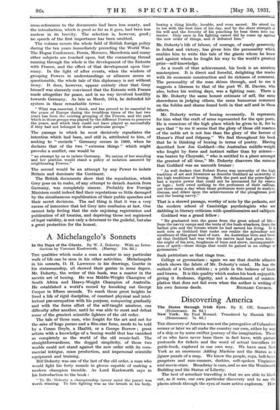A Michelangelo's Sonnets
In the Days of the Giants. By W. J. Doherty. With an Intro-
• duction by Viscount Knebworth. . (Harrap. 10s; 6d.)
ME qualities which make a man a master in any particular walk of life can be seen in his other activities. Michelangelo in his sonnets, D. H. Lawrence in his drawings, Goethe in his statesmanship, all showed their genius 'in some degree. Mr. Doherty, the writer of this book, was a master in the ascetic art of boxing. He was Middle-Weight Champion of South Africa and Heavy-Weight Champion of Australia. He established a world's record by knocking out George Cooper in fifteen seconds. To reach those great heights he lived a life of rigid discipline, of constant physical and intel- lectual pre-occupation with his purpose, conquering gradually and with the fierce effort of the self-taught amateur, one difficulty after another, until he was able to meet and defeat some of the greatest scientific fighters of the old order.
The tale of those men, who fought' for the art and not for the sake of huge purses and a film-star fame, needs to be told by a Conan Doyle, a Hazlitt, or a George Borrow ; great artists with a knowledge of a boxing world that has vanished as completely as the world of the old -music-hall. The straightforwardness, the dogged simplicity, of those two worlds could not stand against the new order with its com- mercial intrigue, mass production, and impersonal scientific equipment and training.
Bill Doherty was one of the last of the old order, a man who would fight his forty rounds in gloves capable of making a modern champion tremble. As Lord Knebworth says in his Introduction to the book :
" To Mr.' Doherty a championship (never mind the purse) was worth winning. To him fighting was as the- breath in his body, boxing a thing kindly, lovable, and even sacred. He stood toe to toe with the best men of his day, and by the sheer strength of his will and the ferocity of his punching he beat them into sur- render. Only once in his fighting career did he come up against the new order of things, and it defeated him."
Mr. Doherty's life of labour, of courage, of manly generosity in defeat and victory, has given him the personality which enables him to write this tale of the giants whom. he knew and against whom he fought his way to the world's greatest
prize—self-knowledge.
As a result of that achievement, his book is an amateur
masterpiece. It is direct and forceful, delighting the reader with its economic construction and its richness of comment, The personality of the man shines through, and to me it suggests a likeness to that of the poet W. H. Davies, who also, before his writing days, was a fighting man. There is in Mr. Doherty the same honest estimate of self, the same shrewdness in judging others, the same humorous comment on the foibles and shams found both in that self and in those
others.
Mr. Doherty writes of boxing reverently. It represents
for him what the craft of arms represented for the epic poets. He is conscious of the high place which he gives to it, for he says that " to me it seems that the glory of those old masters of the noble art is not less than the glory of the heroes of Homer's Iliad and Odyssey." We find throughout his book
that he is thinking of boxing in terms of poetry. ' Having described how Joe Goddard—the Australian middle-weight who fought by force and instinct rather than by science— was beaten by Choynski, " who is entitled to a place amongst the greatest of all time," Mr. Doherty disavows the rumour that Goddard was an uncouth bruiser :
" As well declare that Robert Burns was unworthy of. the high tradition of art and literature as describe Goddard as unworthy of the high traditions of boxing. Both the poet and the prize-fighter had a mystic power that could not be accounted for by reason or logic ; both owed nothing to the professors of their callings, yet there came a day when those professois were proud to analyse, discuss, and dilate upon the achievements of the ploughman poet and the boxing navvy."
That is a shrewd passage, worthy of note by the pedants, and the modem school of Cambridge psychologists who are dabbling in literary criticism with questionnaires and callipers.
Goddard was a grand fellow :
" He graduated into the game from the great school of life— from the navvy camps and the tents of the bush-whackers, from the ballast pits and the forests where he had earned his living. It is such men as Goddard that make one realise the splendour and excellence of this great land of ours. An Australian born and bred, all that Goddard had was what his native land had given him— the might of his arm, toughness of bone and sinew, unconquerable- ness of spirit—those things that could be gained in no college or gymnasium."
Such patriotism as that rings true.
College or gymnasium again we see that double allusion which shows the fabric of Mr. Doherty's mind. He his the outlOok of a Greek athlete ; a pride in the balance of brain
and brawn. It is this quality which makes his book enjoyable,
giving it freshness, dignity, and a detachment of contem- plation that does not fail even when the author is writing of






































 Previous page
Previous page